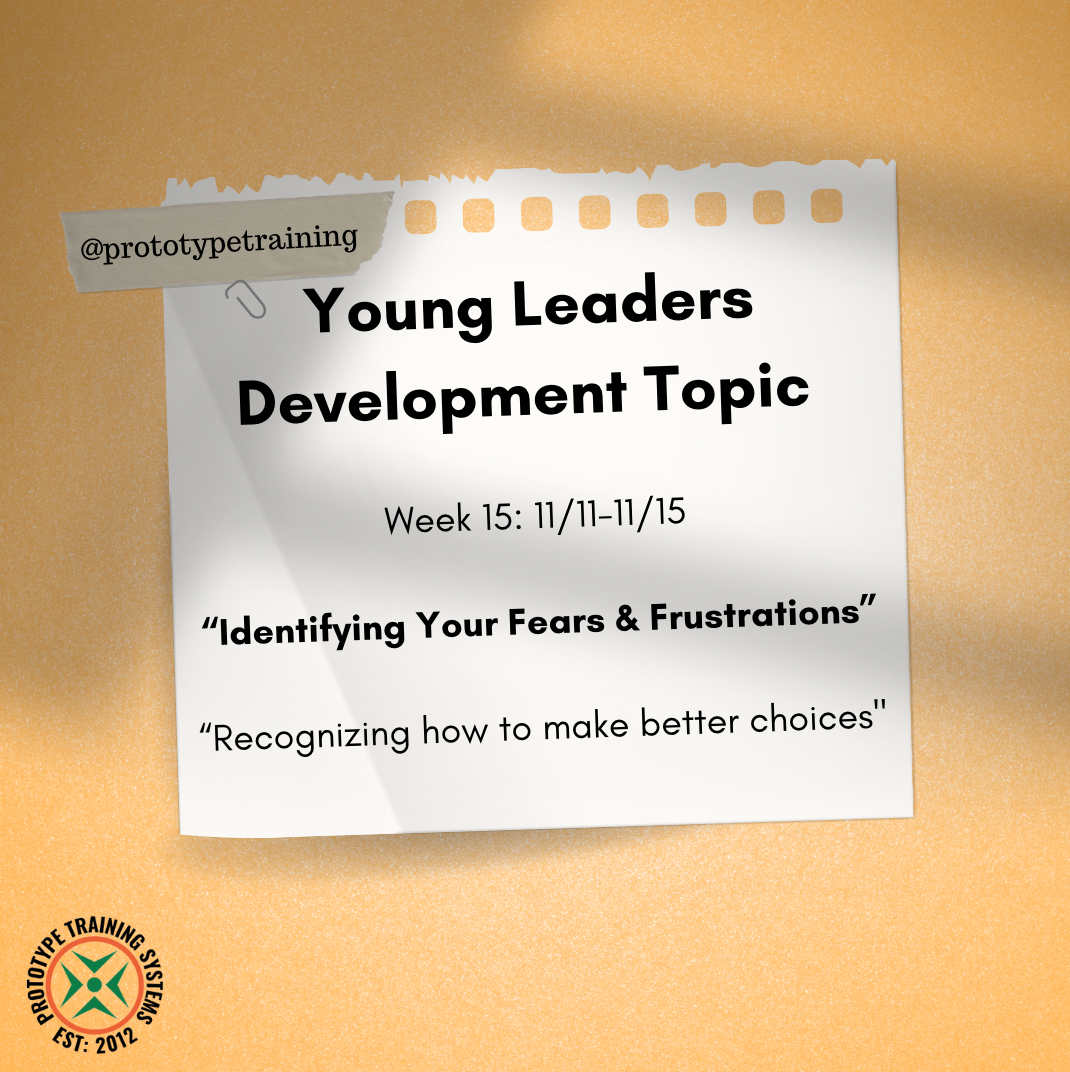Developing Young Leaders: Identifying Your Fears & Frustrations
Mike Collette • November 15, 2024
Identifying Your Fears & Frustrations

Identifying Your Fears & Frustrations
Last week, we explored self-drive and how it is a trainable skill. This week, we started to scratch the surface of how fear and frustration affect how we think and how we take action. When we make decisions from a place of fear or frustration, those decisions are often poor. So, how do we get out of that mindset and allow ourselves to think more creatively and make better choices? It’s a skill that requires practice, but the first step is to take a step back and identify what our default tendencies are when we feel frustrated or fearful.
In this week's LTAD sessions, we did some CDC (Cross-Domain Coaching). We created a simple game designed to generate low levels of frustration, and we tracked when and how that frustration emerged. This exercise helps build awareness of their default tendencies and hopefully helps them recognize similar behaviors in other areas of their lives.
Here are some quotes that came up during the game:
- After getting 0 points on the first 2 turns:
"I hate this game."
- After scoring 6 points on the next turn: "Only goal is not to come in last."
- After scoring 0 points on the first 3 turns: "I'm not trying."
- After scoring 7 points on the last turn: "If I did this every round, I would have won."
These comments aren’t groundbreaking, but they show how, when faced with early struggles or failure, the kids can quickly shift into frustration and blame the environment.
You might be wondering, how does all of this tie back into the self-drive work we did last week? One thing we’re seeing is that, in areas where we have self-drive, we tend to reduce fear and frustration more quickly. It doesn’t stop us from taking action, and we can make better decisions as a result. Understanding our tendencies when fear and frustration appear—and recognizing how they differ in areas where we feel driven—is key to making progress.
In today’s class, we’re experimenting with adding video games into the workout to see how we can dial up competitiveness and observe how frustration affects performance.
Previous Blogs

Enzo is a standout part of the Prototype community—supportive, determined, and a pleasure to be around. His commitment to consistency, camaraderie, and long-term progress makes him a perfect example of what PTS is all about. Below he answers some questions and shares his experience. Share your experience at Prototype—favorite memories, moments, or stories or what’s your favorite part/what do you look forward to? When I first went to the gym, coming from the Nike camps, being at a real gym was a great experience. The coaches were all excellent and helped with my growth. Who at Prototype has made the biggest impact on you and why? Steve Cimino - has coached me 1 on 1 and continues to build out my program at the gym. What are your hobbies and activities outside the gym? Soccer, and more soccer. I also ski in the winter. How has Prototype helped you or solved a problem for you? It has made me better for sports for overall speed and strength, this translates to my soccer programs. What are your current fitness goals? To get faster on the soccer field. Favorite Quote No quote, but I like movies.

Sharang is a standout part of the Prototype community—steady, positive, and always putting in the work—and his commitment to consistency, camaraderie, and long-term progress makes him a perfect example of what PTS is all about. Below he answers some questions and shares his experience. Share your experience at Prototype—favorite memories, moments, or stories or what’s your favorite part/what do you look forward to? What stands out most about Prototype is the camaraderie. The members, especially in the 7AM and Noon classes, create a great balance of fun and focus. Everyone is friendly and supportive, but when it’s time to work, people take the WODs seriously and push themselves to improve. That combination can be hard to find. All the coaches play a huge role in setting that tone. My favorite moments are the everyday ones i.e. showing up, putting in the work together, leaving class feeling accomplished. What I look forward to most is continuing to train alongside people who genuinely enjoy the process and want to get better. “Because summer’s coming.” Who at Prototype has made the biggest impact on you and why? As a dad of two young daughters, the people who’ve made the biggest impact on me at Prototype are the women in the gym. They all train with confidence, strength, consistency and set a powerful example. It’s the kind of environment I hope my daughters grow up seeing where strength is normal and earned. What are your hobbies and activities outside the gym? I dabble a bit in photography, star gazing and love to travel. Playing atrocious golf. How has Prototype helped you or solved a problem for you? Prototype has helped me stay active. There’s a real sense of happiness and accomplishment after each workout, and that feeling has become addictive in the best way. Knowing I’ll leave class feeling stronger, physically and mentally, keeps me coming back. Prototype has turned working out from something I should do into something I genuinely want to do, which has made a huge difference in maintaining a sustainable fitness routine. What are your current fitness goals? Steady progress and longevity. If I can keep lifting, moving well, and feeling good years from now, I’ll consider that a win. I hope my future self will thank my present self. Favorite Quote If you can’t explain it simply you don't understand it well enough.
Climb to New Heights
Prototype Training Systems is more than a gym - it is a lifestyle. Join us today!


